If you’re looking to get pregnant anytime soon, you’re probably aware that optimizing your health will be important during both conception stages as well as the pregnancy itself.
Many women are given recommendations by their doctors on how to care for themselves, but sometimes health advice that is beneficial for these women may be overlooked or not mentioned by certain types of doctors.
The following 10 health tips are specific ones you’ll want to pay attention to if you’re trying to get pregnant and want to improve your health as well as optimize your chances of getting pregnant.
These tips are also helpful for women of any age and they can easily be incorporated into a diet all at once.
1. Eat 9 Servings of Fresh Fruits and Vegetables
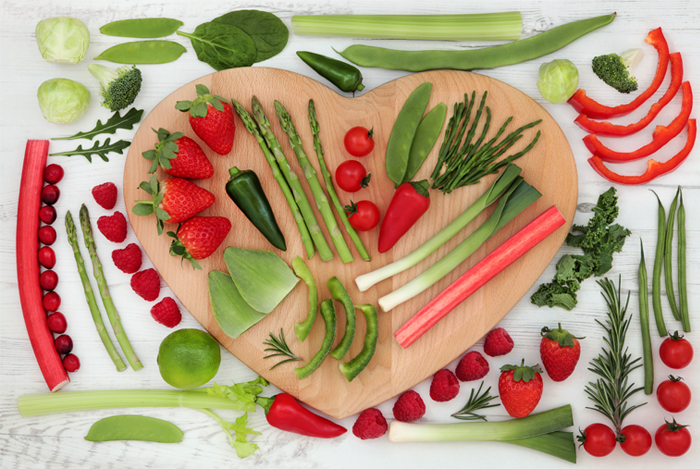
The minimum recommendations for fruits and vegetables each day is 9 servings according to the USDA, however, you could certainly eat more than this if you want.
Fruits and vegetables are critical for optimal health; they’re also important for maintaining a good mood, healthy weight, and can help you improve your chances at getting pregnant since fruits and vegetables improve fertility.
It’s easy to eat fruit all day and forget about vegetables, but be sure you eat some non-starchy and starchy vegetables every day for optimal fiber intake and since they’re important for organ function.
Here are some of the most nutritious fruits and vegetables to eat:
- Blueberries
- Bananas
- Raspberries
- Dark cherries
- Blackberries
- Cranberries
- Goji Berries
- Mulberries
- Acai fruit
- Mango
- Pineapple
- Apples
- Pears
- Red peppers
- Broccoli
- Cabbage
- Kale
- Arugula
- Celery
- Zucchini
- Tomato
- Cucumber
- Sweet potatoes
- Red potatoes
- Purple potatoes
- Winter Squash
- Gold potatoes (Yukon variety)
- Cantaloupe
- Oranges
- Watermelon
- Avocado
- Coconut
It’s easy to add these foods into your day whether at meals or eaten alone. Work them into your diet however you can and your body, brain, and chances of conception will improve!
2. Folate
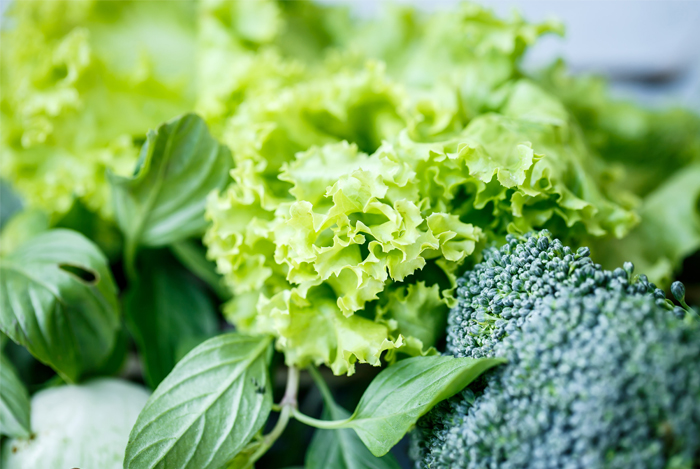
Folate is a B vitamin that is naturally present in many foods such as asparagus, Brussels sprouts, dark leafy greens, peanuts, black beans, kidney beans, oranges, and enriched foods (which are not the most optimal source).
Folate is necessary for our bodies to produce DNA and to help our cells divide.
Improper folate intake can result in developmental problems in children which is why women who are trying to get pregnant and pregnant women are told to take folic acid by their doctors. Folic acid is a supplemental form of folate found in over the counter drugs.
A folate-rich diet that’s full of a variety of plant-based foods can give you all the folate you need, which is 400 mcg (micrograms) of folate a day.
3. Iron-Rich Foods
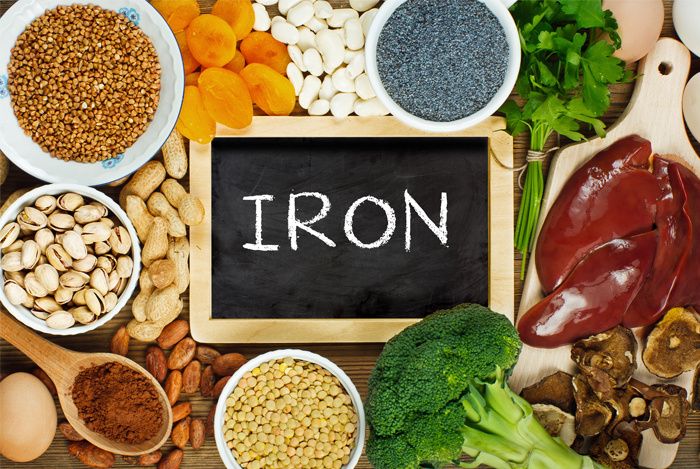
Iron is lost during menstruation and is important to obtain through your diet while you’re looking to get pregnant.
Even once you do get pregnant, it’s important to optimize your diet so you feel your best and your red blood cells function optimally.
Although iron is found in animal products, you can adequately obtain iron through plant-based foods such as oats, chia seeds, legumes, and some nuts and other seeds. Even vegetables like potatoes are rich in iron!
To help your body absorb the iron from plants, be sure to eat foods high in Vitamin C such as fresh fruits and vegetables. Vitamin C helps the body absorb and utilize plant-based iron efficiently and without the risks of eating meat.
4. Healthy Fats

Healthy fats are important for cellular function, brain health, and they’re vital for conception because in order to conceive, you need your hormones to function at optimal levels. Healthy fats help produce certain hormonal reactions in our bodies and can improve fertility.
Specific foods that are great for their healthy fat profiles are avocados (also a good source of folate), raw nuts and seeds, olives, coconut, and wild-caught fish.
Avoid oils when possible and use whole sources of fat for optimal heart health. It’s also helpful to eat more plant-based, whole fats than animal fats for optimal heart health since they’re lower in inflammatory proteins.
5. Lean Protein
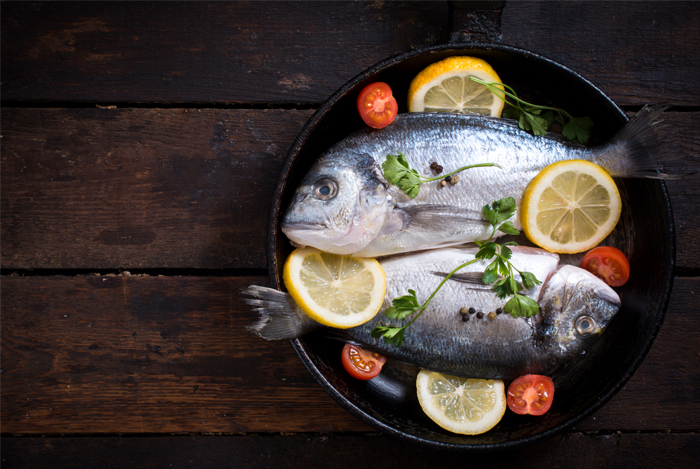
Lean protein from beans, legumes, nuts, seeds, whole grains, and wild fish are optimal sources of lean protein for women to consume. Lean protein will help keep the body strong as well as ensure the heart and brain get the adequate nutrition that they need.
Avoid high-fat sources of protein such as meat, eggs, and fatty poultry. It’s also best to consume more whole food sources of lean protein rather than eating processed options like protein bars.
Some women may choose to use protein powders in smoothies or shakes if they feel too sick to eat a morning meal; if this is the case, choose a raw or unprocessed option and one that’s plant-based such as hemp protein.
6. Fiber
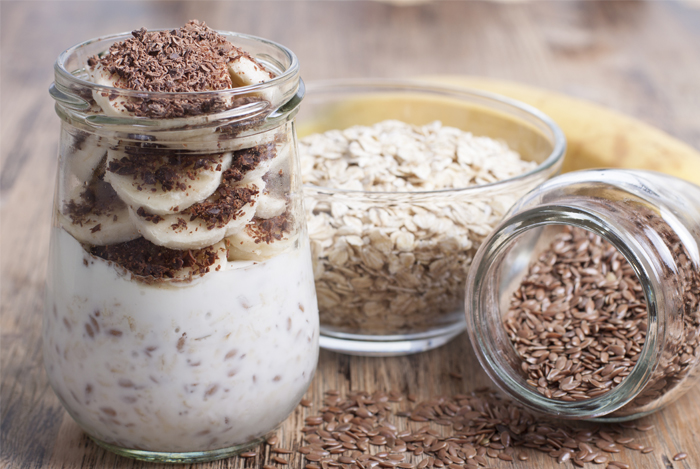
Fiber is found in all plant foods, specifically whole foods such as fruits, vegetables, greens, legumes, grains, nuts, and seeds. Fiber is important for optimal bowel health, digestive health, heart health, and for daily detoxification.
For women looking to get pregnant or who are pregnant, adequate fiber intake can help improve their digestive system, energy levels, and their heart health so they feel their best.
Fiber intake can also prevent complications from low-fiber diets such as high cholesterol, constipation, hunger, and for irregular blood sugar levels.
A high-fiber breakfast of oatmeal with fruit and flax seeds, or a smoothie with greens, fruit, raw almonds, and flax are both great ways to add more fiber to your morning. Have more vegetables, salads, and fruits in place of processed foods, and enjoy cooked vegetables every single night at dinner.
7. Get at Least 8 Hours of Sleep Every Night

Getting enough rest is also very important if you’re trying to get pregnant.
Sleep helps restore your hormones and will reduce your cortisol levels. Cortisol is your stress hormone and when it’s elevated, your body doesn’t produce optimal levels of progesterone needed to get pregnant.
Lack of sleep can also interfere with your mood, energy levels, cause your blood sugar to function poorly, and it can negatively affect other parts of your health too.
If you struggle with getting enough rest, try using natural ways to fall asleep faster such as sleepytime tea, magnesium supplements, or taking an Epsom salt bath before bed.
Eight hours is a great goal to shoot for to get enough sleep, but if you feel you need more, allow your body to rest as much as it needs, especially once you do get pregnant.
For conception, it’s very important to reduce the stress in your life by getting enough rest; this helps improve hormone function and can improve ovulation.
8. Movement and Exercise

Moving your body is a great way to improve your hormone function! Sedentary lifestyles are also dangerous for your heart health and can lead to weight gain that disrupts optimal hormone function.
Choose types of exercise you enjoy; some great ideas are yoga, walking 30 minutes a day, and lifting weights. Or, use a rebounder or go on a jog.
Do bodyweight exercises such as yoga and pilates if you don’t enjoy weights, and try to incorporate stretching into your routine each night or morning to improve your flexibility and blood flow.
9. Moderating Stress

Since stress can wreak havoc on your health, it’s also helpful to moderate and reduce the stress in your life however possible.
Some wonderful ways to moderate and reduce stress in your life that are within your control are to exercise, meditate, journal, and participate in hobbies you enjoy. Spending time with friends and family who uplift you is also a great idea.
The less stressed you are, the better your hormones will function, and therefore, the easier you will conceive and have a happier and healthier pregnancy.
10. Eliminating Food Intolerances or Sensitivities

Last but not least, it’s important to eliminate or reduce any food intolerances and sensitivities you have while trying to conceive. While this might not seem significant to pregnancy, it’s of utmost concern because food sensitivities and intolerances can impair gut health if left unchecked.
If the body is damaged from too many inflammatory foods being eaten that it doesn’t agree with, leaky gut syndrome may occur and may lead to further complications as you try to conceive or thereafter.
Common food intolerances include gluten, soy, corn, wheat, dairy, peanuts, and shellfish, although others may occur.
Eat as many fresh foods as possible and eat more simple, whole foods such as fresh fruits, vegetables, greens, starchy root vegetables, lentils, black beans, chickpeas, other beans, gluten-free oats, quinoa, and healthy fats such as avocados, coconut, and raw nuts and seeds should you tolerate them.
Test foods out to see which ones agree with you and which ones don’t, then do your best to eat a diet without any that disrupt your digestion or cause an allergic reaction in you. You can also have tests run by your doctor or an allergy specialist to rule out any intolerances and allergies should that be something you want to do.
Along with eliminating food sensitivities, eating probiotic-rich vegetables like kimchi and sauerkraut can also improve gut health.
Probiotics help improve gut health as well as immune function and energy levels. Probiotic supplements may also be helpful as well, but be sure you buy them refrigerated to ensure they’re still alive and have the beneficial bacteria you need for optimal gut health.
Don’t Forget:
A healthy pregnancy can improve both the lives of the mother and child, so if you’re trying to get pregnant, go ahead and set yourself up for success now. Your health and your future child’s is in your hands!
The post 10 Tips to Pay Attention to If You’re Trying to Get Pregnant appeared first on Nutrition Secrets.
http://www.nutritionsecrets.com/10-tips-to-pay-attention-to-if-youre-trying-to-get-pregnant/
No comments:
Post a Comment